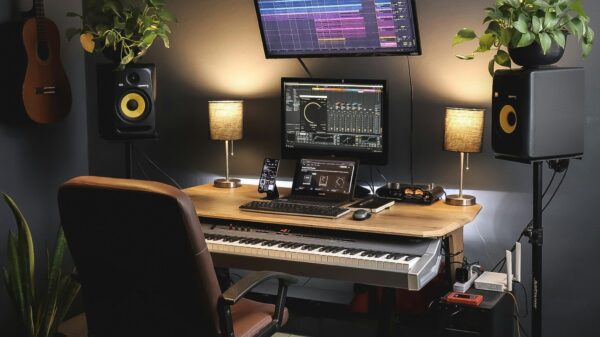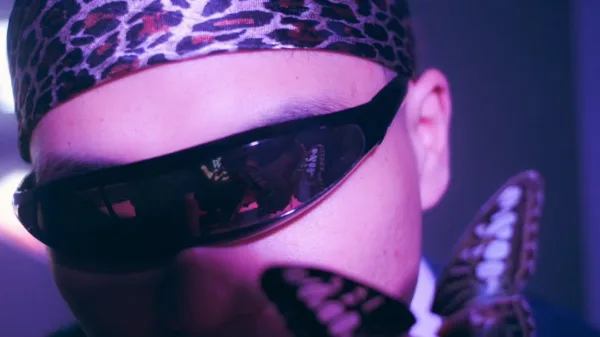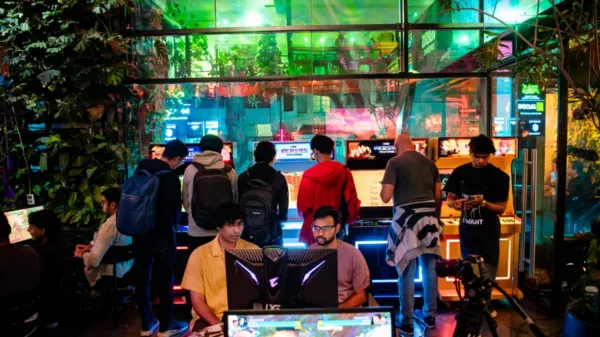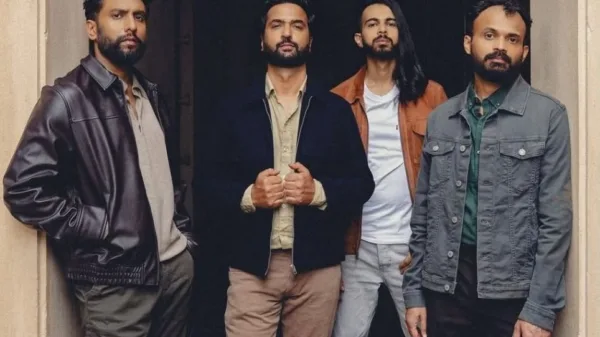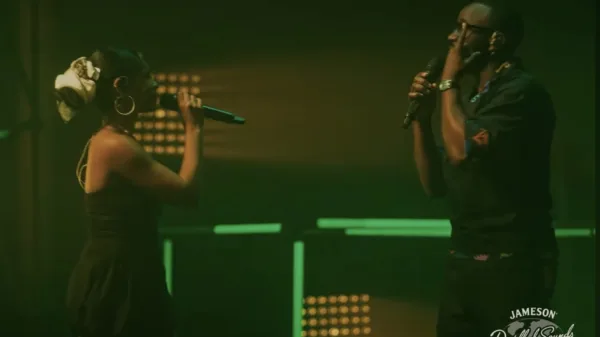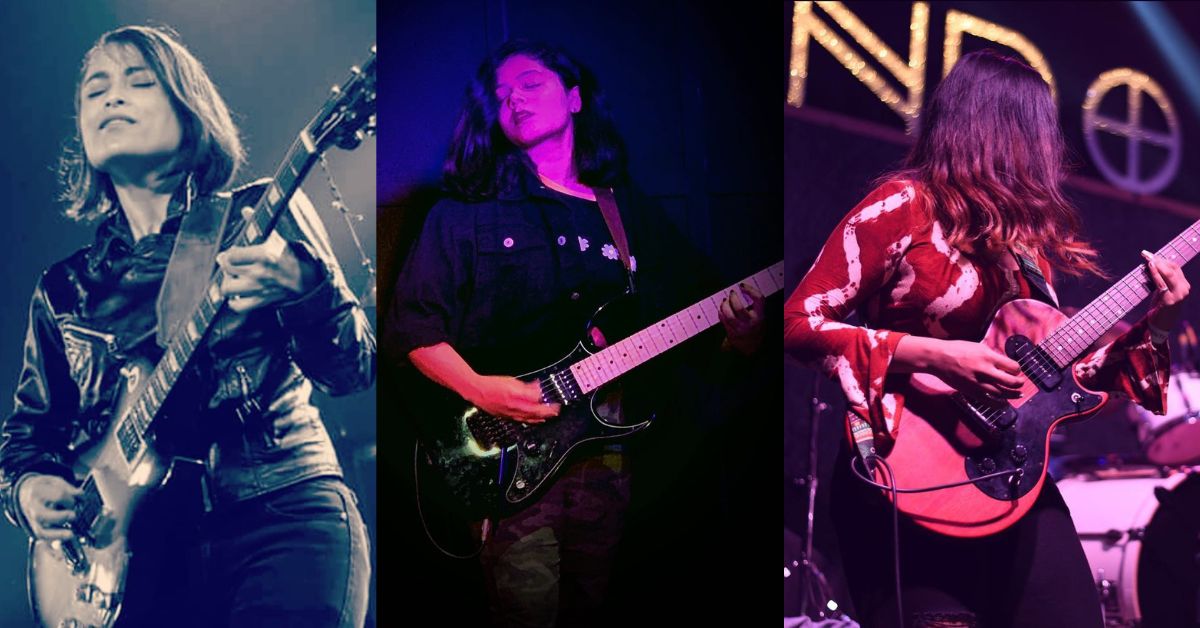Back when blues guitarist Aayushi Karnik was induced into Fender India’s roster of endorsed artists nearly a decade ago, it was the peak moment for female representation in a male-dominated arena to thrive with all its colours. But since then, the disparity between the ratio of male to women guitarists in the Indian music scene has only seemed to expand, with the former influencing the guitar-music space more than its counterpart.
If I tried to analyze and pick apart why this posits to be such a talking point, it would take me another big essay to jot it all down. But today we are focusing solely on women guitarists of the country who are paving the way for others like them to follow in their footsteps. These women have consistently made sure to remind everyone that it doesn’t matter who you are or where you come from, if you’ve got the skills you’re just as good as anyone else playing that particular instrument.
Although the number of women guitarists in the scene continues to be minimal to this day, it is important that we talk about those who are trying to break stereotypes and emerge successful in spite of the hardships that come their way. In hindsight, it could also serve as an example for young girls to pick up the instrument without leaving any space for anxiety or self-doubts to creep in. Who knows, maybe one day we’ll reach a stage when there are even more women guitarists as there are men; when the term “female guitarists” or “female musicians” would become obsolete and the music scene of the country would encourage more women to nurture their passions and showcase their art to the audience more so than ever.
Tipriti Kharbangar (Soulmate)
Shillong-based blues outfit Soulmate’s frontwoman Tipriti Kharbangar recounts feeling drawn towards the guitar ever since the first time she came across her father’s Gibson acoustic guitar. And needless to say, it was love at first sight. She eventually got him to teach her her very first chords and hasn’t looked back since. “I think I was 7 years old when he first started teaching me,” she recalls.
“I’ve always been drawn towards all types of musical instruments. Even now whenever I find musical instruments, I gravitate toward them. The guitar was one of the instruments that we had at home and I wanted to learn to play it so I could sing along when I’m playing,” she adds. The guitarist who also does vocals for the band draws inspiration from quite a few iconic musicians throughout history. “I have a range of musical influences from Sister Rosetta Tharpe to Mahalia Jackson, Janis Joplin to BB king, Clapton to Peter Green, Ginger Baker to Fela Kuti, and Bob Marley, and I can go on and on,” she says.
The artist claims that in her musical career she has had supportive peers and colleagues who have been absolutely non-questioning of her abilities as a guitarist. The only struggles that she has had to face as a touring musician are universal problems that others like her also experience. “I find as a woman, the struggles that I have faced are similar to what every female musician goes through when it comes to touring and traveling or even performing when you’re having your time of the month,” she comments. She also confesses that at the beginning of her career she had struggled to convince her parents that this is a viable career path to go for. But eventually, things turned out to work out for her as she did not feel pressured to go out of her way to impress others. But rather she feels a sense of catharsis from exploring her craft more than anything else. “Sometimes when I do feel the pressure to prove myself, it is mostly in a positive way to better myself and my playing,” she adds.

Tipriti also believes that there is hope for the scene to change in the next couple of years with more women feeling encouraged to pick up an instrument and make good music. “There are a number of very talented musicians in the country now. The newer generation of female musicians has a good chance of getting their music heard with the help of social media and exposure.
Back then when we didn’t have the internet, it was difficult to see and share talent. Now I feel it has been changing,” she says. She goes on to name a couple of independent musicians whom she has been following in recent times like Aditi Ramesh, Gowri Jayakumar, and Aarifah Rebello, to name a few. “I feel this will only lead to more inspiration and hence more girls to have the confidence to pick up a musical instrument,” she adds. In her career as a blues musician, Tipriti has also had the opportunity to meet some of her beloved idols. She recounts sharing the platform with some of the greats like Carlos Santana and also meeting legends like Buddy Guy, Taj Mahal, Derek Trucks, Keb’ Mo’ etc. However, she fondly remembers one particular moment during their first American tour. “We performed our first few gigs and I had met some African American ladies who came up to me and told me that even though I was from India my soul was from the Mississippi.,” She exclaims that she felt overjoyed after hearing that.
Nishitha Kaveramma (ZedAxis)
Nishitha Kaveramma picked up the guitar right before she got into college and has been playing for 7 years now. The guitarist who has taken up the guitar duties in Bangalore-based grunge outfit ZedAxis, has always been an avid rock music enthusiast ever since she was a child. “I always enjoyed listening to rock music growing up and, although I was very fascinated by drums, I felt like whatever I listened to was mostly centered around the guitar and eventually I was inclined to pick it up and learn the instrument,” she says.
The guitarist claims that she has always been surrounded by male friends when it came to music other than her sister. “I barely knew any girls who shared the same music interest as I did, at least a couple of years ago,” she claims. According to Nishitha, her fellow musicians have been nothing but supportive of her and respectful of her craft. “I never really felt like I had to prove anything to them because we were all on the same journey, doing the same chores and at the end of the day what mattered was music and being passionate about it,” she adds.
On the same note, she has also never had to face any discrimination against her male counterparts either. “Mostly because the kind of people that I played/worked with have not looked at me as a “female guitarist” but just as a guitarist. I’m glad to have come across such people who’ve been nothing but supportive and encouraging,” she comments. She cites Olly Steele, Yvette Young, Joe Duplantier, Aaron Marshall, Mark Lettiere, and Max Ostro as a few of her inspirations. Although she is more drawn toward Death frontman Chuck Schuldiner and credits him for motivating her to pick up the guitar.

Nishitha is also of the opinion that even if relatively there are fewer women instrumentalists as compared to men, it does not mean that the number of women who are rocking out with their instruments is any less. “There are some fantastic women out there who are doing really well in the music scene so I wouldn’t say there is a lack of us,” she says. She feels that one has to be passionate about learning an instrument and be fully invested in it to play it professionally in the music scene. She also admits that a lot of people she has met are interested in the instrument, but are not as dedicated to it. “I’ve come across a lot of women who are interested in picking up the instrument and have the same taste in music as I, but they are not willing to put in the effort and time into doing so because they do not prioritize it the same way we do,” she claims. Contrarily she agrees that it is only recently that she has “discovered and witnessed some of them as compared to how it was a few years ago.”

The guitarist also recalls the proudest instances in her career as a performing musician is “when I’m playing to a large group of people on stage and they recognize me, treat me with respect, and love what I do.” “I’m only a music enthusiast who’s gotten the opportunity to spread the joy of it with people, so watching them enjoying it with you, is an amazing feeling. It’s definitely something I’m proud of,” she says.
Aishwarya Ramasami (Session Guitarist)
Nishitha’s fellow guitarist and contemporary Aishwarya Ramasami’s guitar-playing journey started when she picked up the instrument in 2015. Starting by playing an acoustic guitar, she eventually moved on to the electric in a matter of just two years. The guitarist, who had grown up being trained in Kathak and Bharatanatyam, and Hindustani music, did not feel like a natural in those art forms. “Even though I grew up influenced by classical dance and music, a part of me felt like it didn’t come to me quite naturally,” she comments. “Picking up the guitar was probably the most random decision I have ever made, but for the first time, it was “MY” decision. I enrolled myself in classes and I absolutely fell in love with the instrument. I would end up spending hours playing without realizing the time! That’s when I knew that I wanted to pursue this instrument!” she exclaims.
She ended up getting into progressive metal/ djent and metalcore-influenced sounds, religiously following Misha Mansoor, Mikael Akerfeldt, Joe Duplantier, Mark Holcomb, Jesse Cash, Drew Goddard, Olly Steele, Mark Hosking, and Plini. Working as a financial accountant during her day job, she claims that playing guitar has always been her escape from monotony. “My parents have always been extremely supportive of my music and even encouraged me to pursue a career in music. But ironically, I always knew that I wanted a career in finance and wanted to keep the guitar as a positive let-out for when things got hectic,” she says.
Reminiscing about her first-ever band competition win, she says: “The first time I ever performed at a competition back in college, I won the “best rhythm guitarist” out of 15 odd bands. That definitely was a great starting point for me. I felt more motivated than ever to practice more and get better at the instrument.”
Aishwarya’s decision to not pursue music professionally has exempted her from the pressures of proving herself and it has only worked to her advantage. “The content I put on social media platforms, is for myself and myself only. It is only natural to seek validation, but that has never been a priority for me. I post videos of me playing guitar because it makes ME happy,” she adds.
The guitarist also brings up another light-hearted yet important topic that has become a talking point in the modern guitar music space in recent times. “I think people need to stop addressing us as ‘female musicians’ instead of just ‘musicians’. I believe this could be a good starting point. Over the years, there have been a few incidents, online and in real life, of men telling me that I am getting all this attention or that I won a competition only because I am a girl, some as jokingly too.”

But yet, she remains hopeful. “Honestly, none of this compares to the immense support and encouragement I have received from musicians around me in real life and online. I’ve had the privilege to meet some amazing guitarists who have been such positive influences and have helped me get better at my craft and I am extremely grateful for them!” she says. When it comes to other women sharing her love for the instrument, she remains optimistic. I do really hope that more and more women come forward and find the motivation to pick up the guitar or any other instrument for that matter! I do believe that times are changing and hopefully a few years down the lane, we will be surrounded by more female influences,’ she comments.
As established previously, female representation in guitar-based music has been and still remains to be excruciatingly low in the country but these musicians have been inspirational when it comes to putting themselves out there and demanding the same space as their male counterparts in the independent music scene. And if their presence in the scene holds even a modicum of importance in contributing to the number of women instrumentalists in its ambit, it certainly makes a whole lot of difference no matter how minute the progress may seem.














